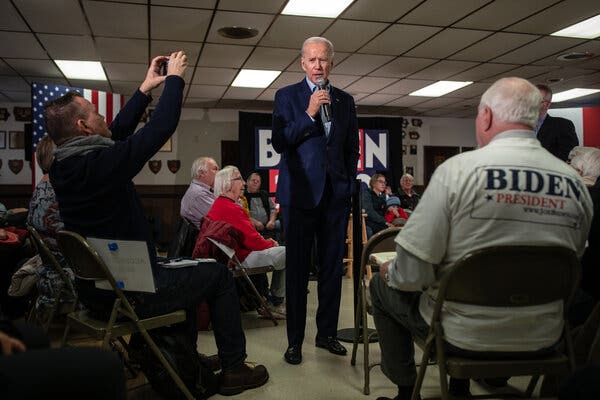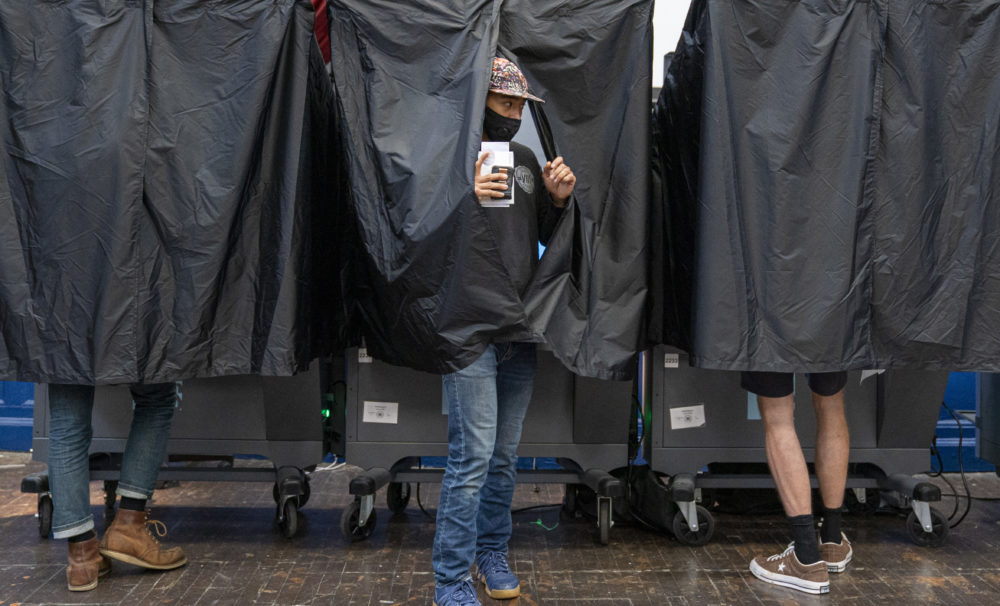Advertisement
Liberal groups had already ramped up efforts to win over veterans and military families in swing states, where even a small shift could prove decisive.

WASHINGTON — Long before The Atlantic published an article on Thursday night depicting President Trump disparaging America’s war dead, liberal veterans groups had been feverishly working in battleground states to appeal to veterans and military family members, a cornerstone of President Trump’s base.
That effort got a significant jolt in both interest and money, and the attention of Joseph R. Biden Jr., in the hours after the article appeared.
By Friday morning, Democrats, especially those with a military background, were reacting with both outrage and a sense of opportunity, denouncing Mr. Trump in news conferences and press releases and assuring veterans and military families that they had their backs.
Mr. Biden, the Democratic nominee for president, lashed out at Mr. Trump on Friday afternoon in a speech in Wilmington, Del., noting that the remarks attributed to the president were part of a long pattern of dismissing military families and their concerns.
“If what is written in The Atlantic is true, it’s disgusting,” Mr. Biden said. “It affirms what most of us believe to be true: that Donald Trump is not fit to be commander in chief.”
In recent months, political groups devoted to veteran and military families have raised millions of dollars to target veterans with advertising, working with the types of sophisticated data lists usually used by Democrats to go after minority and swing voters.
On Friday, less than 12 hours after The Atlantic published its article, the largest liberal veteran organization, VoteVets, released an online ad featuring the parents of troops slain in Iraq and Afghanistan, one speaking in Spanish. In the first five hours after it went up, the group said it raised $100,000 from 2,500 donors.
The Democratic Party is also leaning heavily on its most popular veterans, like Senator Tammy Duckworth of Illinois and Pete Buttigieg, the former mayor of South Bend, Ind., and a former Democratic presidential candidate, to attack the president on his treatment of veterans and the military — something that would traditionally be a strength for an incumbent Republican president but which is increasingly becoming a weak spot for Mr. Trump. Over 70 current and former elected Democrats with national security backgrounds also released an open letter to Mr. Trump seeking an apology.
“For years there has been a movement away from the old assumption that the Republican Party is the party of national security,” Mr. Buttigieg said. “These revelations help push that over the tipping point.” He added, “I think that voters need to hear from those who did serve. I am planning to be part of a chorus of veterans from different generations speaking to why this is wrong.”
The idea is not to win a majority of the veteran vote, which most Democrats consider nearly impossible, but to peel away a small percentage of persuadable veterans and military family members. While Mr. Trump’s popularity has fallen steadily among troops over the past four years, according to polls, it remains high compared with other subsets of voters.
But in an election that will be won on the margins in key battleground states, Democrats are hoping small movements will help, especially in states like North Carolina, Florida and Arizona, where in 2016 Mr. Trump won twice as many voters with a military background than Hillary Clinton did. In such states, a small number of veteran and military votes, supplementing a base of Black and Hispanic voters, could be enough for Democrats to win.
“In a close race, everything and everyone matters,” said Nathan Gonzales, the editor of Inside Elections, a nonpartisan analysis organization. “We have to remember that Trump did just enough to win in 2016. He won Michigan, Pennsylvania, Wisconsin and Florida by less than two points. Four years later, the president simply doesn’t have any margin for error. He really can’t afford to slip with any voter group, including military families and veterans, because he’s not doing dramatically better with a specific demographic to balance it out.”

The report by The Atlantic’s editor in chief, Jeffrey Goldberg, said that Mr. Trump decided against visiting a cemetery for American soldiers killed in World War I during a 2018 visit to France because he did not believe it was important to honor the war dead. The report, which Mr. Trump vigorously denied, also suggested that Mr. Trump privately referred to American soldiers killed in combat as “losers” and “suckers.”
Mr. Trump is currently running a handful of military-focused ads on Facebook that proudly note that he has killed terrorists, “rebuilt our military” and “repaired a broken V.A.”
Trump says the U.S. has not received proof that Navalny was poisoned.
Sept. 4, 2020, 6:53 p.m. ET
Trump attacks his former chief of staff after a report claimed the president had disparaged fallen soldiers.
Sept. 4, 2020, 6:19 p.m. ET
Trump bestows honors upon another person who praised him at the convention.


